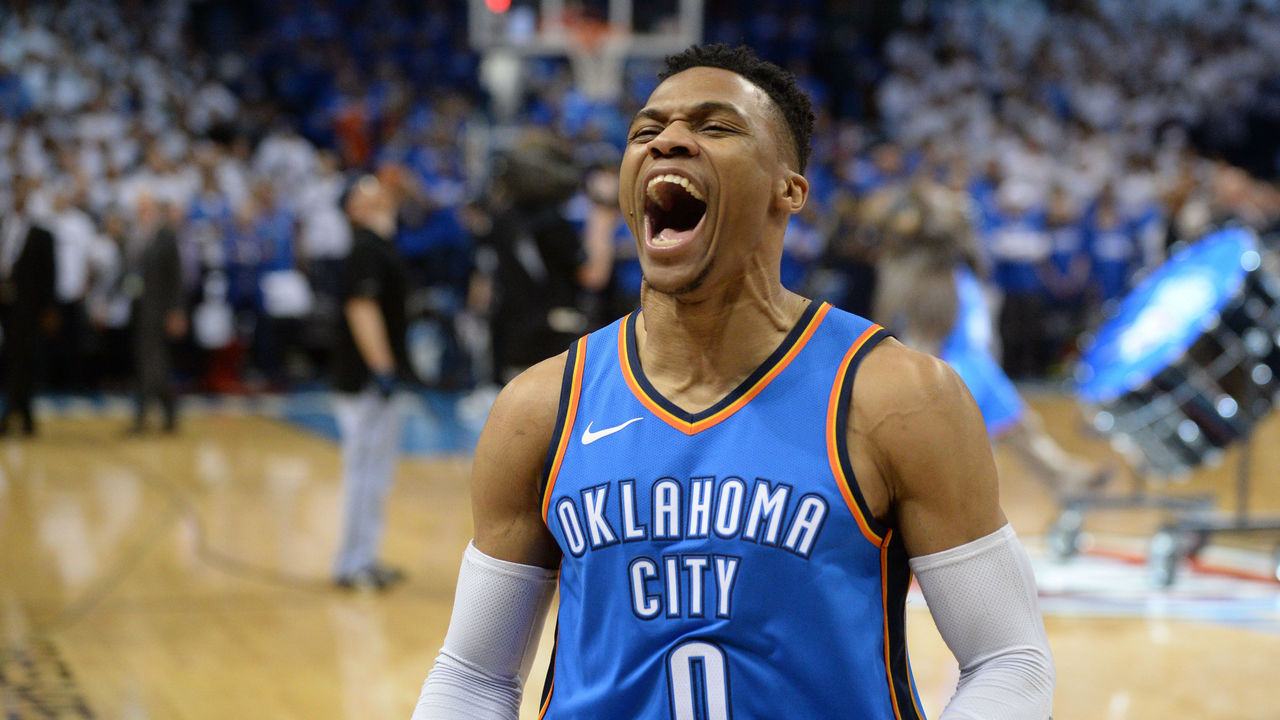Russell Westbrook's force of will is still a magical, terrifying thing
It's no secret this has been a rough postseason for the Russell Westbrook brand. Or it had been, until the second half of Wednesday night's Game 5.
Westbrook's Oklahoma City Thunder were being soundly beaten by a Utah Jazz team with far less star power and on-paper talent, but far more cohesion and purpose. Westbrook, yet to have a good game, was shooting 37 percent from the field and 21 percent from 3-point range, and was being outplayed by both of Utah's starting guards; rookie Donovan Mitchell and playoff neophyte Ricky Rubio, the latter of whom Westbrook had misguidedly vowed to shut down before the Thunder's desultory Game 4 loss.
The Thunder's struggles in the playoffs, and Westbrook's role therein, has brought a familiar tide of judgment of the mercurial point guard rushing back; the gist of it being that it increasingly seems any team containing Westbrook is destined to be swallowed by his unyielding style of play, for better or worse. For most of the series against the Jazz, it has been decidedly for the worse. Against a defense uniquely equipped to take away what they do best and lay their flaws bare, the Thunder's offense has settled into the most extreme version of its stagnant, predictable, Westbrook-led, isolation-oriented, pull-up-jumper-heavy attack. They had 10 assists as a team in Game 4. Ten.
Game 5 was well on its way to being the conclusion this Thunder team deserved. They were once again being picked apart by a team providing a staggering contrast to OKC in both form and function; a perfect counterpoint to everything the Thunder do and don't do. The Jazz were up 71-46 about four minutes into the third quarter; the Thunder were 20 minutes from enduring a soul-searching offseason, and had a foot and four toes out the door.
And then Westbrook happened. It started with that most unlikely and volatile of Westbrook plays: an off-the-bounce triple. And then another one. And then a pull-up mid-ranger. And then a bulldozing layup in transition. And then, all of a sudden, the Thunder had life. They started defending like maniacs and pushing the tempo off misses; Paul George re-engaged and started attacking the basket with Westbrookian fury; the crowd at Chesapeake Energy Arena reached a rolling boil.

There's a look Westbrook gets in his eye when he has his heart and mind set on something, and it's a beautiful and terrifying sight to behold. The Thunder were done and dusted until Westbrook decided they weren't, and his teammates followed his lead. He played the entire second half, and never let up for a second.
With Rudy Gobert in foul trouble, Westbrook and George relentlessly attacked the rim. The Thunder defense continued to pressure the ball, while also switching more and trapping less. Westbrook stepped into a couple more threes for good measure. And so, what initially looked like the last kick of a team in its death throes turned into a miraculous revival. Westbrook finished with 33 points, 11 rebounds, and four assists in the second half alone, and the Thunder ended the game on a 61-28 run.
It's entirely possible that all Westbrook bought them was a stay of execution. Gobert's absence late in the game was an extenuating circumstance that completely changed the complexion of the game, and can't be expected to recur. The Thunder have been blown off the court in both games in Utah this series. Westbrook probably isn't going to shoot 5-of-9 from deep again. And it's not like they stumbled across some magical formula that solved their issues (though shelving Carmelo Anthony, at least, should be instructive and easily repeatable). They still assisted on just 13 of their 39 field goals, while Westbrook's usage rate was an insane 46.4 percent, his highest of the playoffs and second-highest in any game this season. The game was far less about process than result, and the outcome won't make the offseason questions facing Westbrook and the Thunder any less uncomfortable if they ultimately lose this series, as remains the most likely outcome.
Still, this was a stunning, magical return from the brink that was kickstarted and sustained entirely by the fire in Westbrook's belly; by his maniacal force of will. He has deservedly been scorned for his lousy postseason and the way he's helped drag the Thunder down because he can't, or won't, adapt his playing style to a more team-friendly approach. But there are also few, if any, players who could've orchestrated a comeback like this with elimination so close and the chances of survival sitting somewhere around two percent.
No, Westbrook's game didn't evolve Wednesday night, and it seems clear at this point it's not going to. That bull-headed stubbornness can be his team's damnation, but, as Game 5 showed, also its salvation.